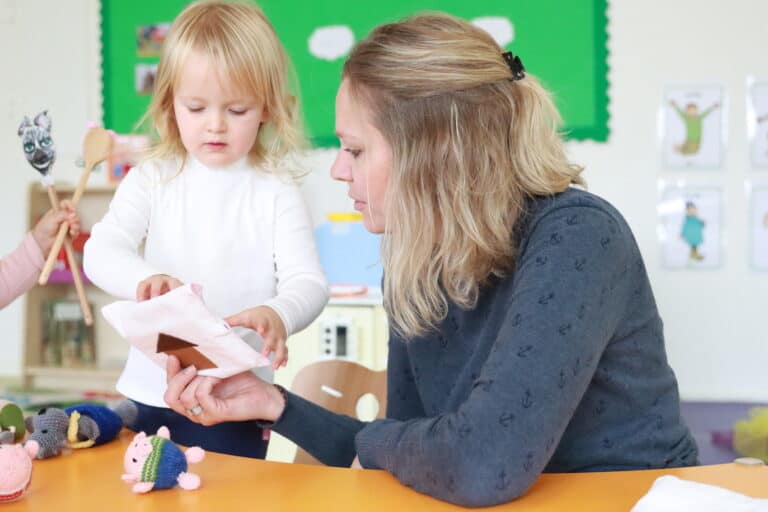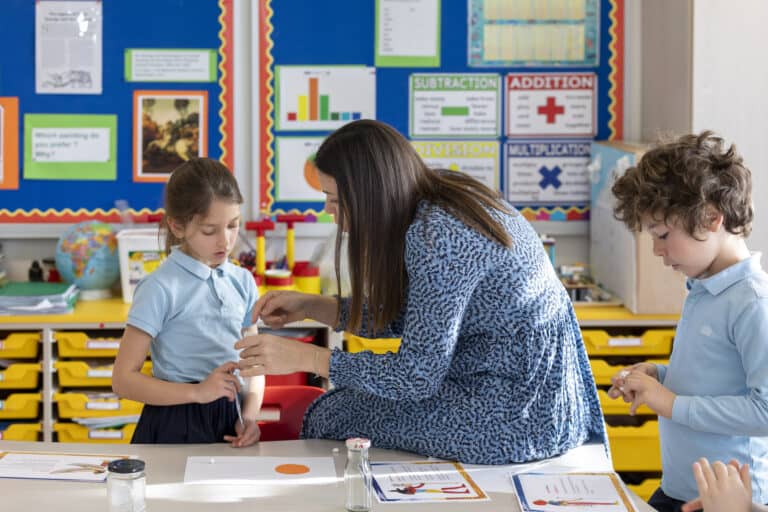Meet the Headteachers – Andy Puttock – La Côte International School

Andy Puttock, Principal at La Côte International School (LCIS) Aubonne, recently sat down with Nick Gilbert, Editor and Publishing Director of International School Parent Magazine.
Like all school leaders, Andy has been coping with the impact of the pandemic over the past year. During this, he has not shied away from a new challenge: he moved from being Director of Education at Nord Anglia Education to Principal at LCIS.
“Young people’s wellbeing will either be the biggest crisis or the biggest opportunity of the second quarter of this century,” says Andy, sharing his vision for successfully leading international schools into their next chapter.
What initially inspired you to pursue a career in education?
I always wanted to be a teacher – My first job was in teaching, and it is my privilege to say that I will also finish my career in teaching. As a teenager, I was active in youth clubs, volunteered in various settings with children and found that I really loved working with young people. In addition, I have always had a passion for languages and chose French, Maths and Latin as my A-level subjects. I then did a degree in modern and medieval languages and went on to become a French teacher.
Following that, I worked as a languages teacher for a few years, became Head of Modern Languages, became a deputy head, then head of a comprehensive school in Essex. I then moved to an even bigger comprehensive school in Dorset as headteacher, where I stayed for 12 years, successfully carrying out a complete rebuild of the school as part of its growth.
Although I loved my time in the UK public school sector, at a certain point, I began to crave a new challenge and exploring international education offered an incredible opportunity to immerse myself in something completely new.
The challenge for me was to adapt my experience as a school leader in the UK public sector to leadership in the private international sector. I went to Beijing and spent four very happy years at the British School of Beijing, part of Nord Anglia Education. Nord Anglia was smaller then; we only had about 13 schools when I joined. At the time, I joined because I loved the school and later learned about the benefits that being part of the group brought to the school, teachers and students. LCIS is now part of 73 premium international schools, which are attracting both staff and families because they are part of Nord Anglia Education. It has been a big change in the last eight years.
What did you learn from the Beijing experience?
Honestly, I learned everything. From a professional perspective, I think I was the classic principal coming out of a public sector environment, thinking that the skills were all just eminently transferable when moving to the private sector. And, of course, many of them are transferable. I had managed huge budgets; I had led schools. But of course, the private sector is very different. The for-profit aspect was new to me, and it was of utmost importance to me to learn how to respond even more closely to parents’ needs and wishes whilst maintaining my educational integrity.
Beijing has an incredibly competitive international school market: huge numbers of international schools are there, and a growing Chinese middle-class is seeking international education. They value the truly personalised, nurturing, and supportive nature of education that international schools offer. Of course, they understand that internationally recognised diplomas such as the International Baccalaureate Diploma Programme open doors to top universities worldwide. Navigating those professional and commercial challenges, and of course, living in Beijing, I learnt so much about life. It is a brilliant city and my family and I spent a wonderful four years there.
What have you learnt from your time as a headteacher of an international school?
I have always passionately believed in the concept of personalised education. When you step into an international context, you realise exactly what that means. All the individual cultures, values and aspirations require a very personalised approach to learning. So not only do we have to ensure that learning really meets the individual needs of students and provide them with a broad range of opportunities to discover new talents and passions, but it is also essential that we establish a strong school family and welcoming culture that celebrates real openness and true diversity.
This is crucial: when you are living in a country where most of your students are ex-pats, the school is so important to them, it is the centre of the community, it is family. Even when I was head of a school in the UK, we talked about the school being a family, and especially in international schools such as La Côte, this is now true more than ever.
What characterises the students graduating from La Côte?
The school has always, I think, been clear about its purpose. It has established itself well as a highly inclusive family school, where children feel nurtured and looked after. I think that is one of the advantages of being a school of our size. But we have also really focused on our academic record of excellence in the last three or four years, which of course, is the key factor for our parents and students who aspire to join great universities.
And so, when I look at our graduating class this year, they are ready to make a difference in the world; they are eager to go out and become leaders in their respective fields. We already know some of our students will receive outstanding IB diploma results and fantastic university offers. We have students with offers at the Ivy League, MIT has made early offers, and we have students gaining places at top UK universities.
How has the recent shift to online learning affected how you teach your students?
We were actually fortunate in Switzerland – we only had one closure in the spring. And although we are ready to switch to virtual learning if needed, it looks like we will remain open – fingers crossed. Of course, virtual learning will never be the same as being in school. However, we established a high-quality virtual school experience, which parents very much appreciated.
For our graduating classes, preparing them for the future has also been critical. Our recent LCIS graduates already tell me that much of their university learning is now online, even pre-pandemic, for lectures and even tutorials. Of course, learning is still a social activity at university, but it does not necessarily mean being in the same room as your peers. And I think the way we can prepare our students for that is so important. So, our virtual learning provision is not just a reaction to the pandemic but a deliberate preparation for their future at university and beyond.

What would you say makes the learning environment at La Côte extra special?
We are quite a compact school, which allows us to follow each of our students closely as they grow, from the youngest children right the way through to the senior students, and we make sure that every single student benefits from this close relationship. The other facet that we have always focused on and that we are passionate about is true personalisation in all its different aspects.
One of these is well established in many schools. Most schools today make sure that they know each student well and tailor learning to their needs. But the thing I see is crucial to an education that really supports students to thrive. Again, Nord Anglia is at the heart of this, making sure that we offer just the most phenomenal opportunities to allow our students to discover things they never knew they would love.
One of the dangers a school, especially an international school, can fall into is trying to be all things to all people. International should not just mean ‘British international’ or ‘IB international’ school or ‘the international school of somewhere’. A school like ours, whose raison d’être is international – and not just in the sense of curriculum – is all about offering global perspectives, global opportunities, and an international mindset. Our location in Switzerland, set in beautiful countryside but close to truly great global cities, gives us a unique opportunity to do this. We must support our children to flourish within their own culture and language. We must nurture the active values, attributes and skills needed to facilitate positive change in the future.

Which features of the school do parents value the most?
Even though I have not yet met many of our parents in person because of the pandemic, I cannot wait to do so – I am in regular contact and have had many great conversations with them, which I value very much. This dialogue, this working in partnership with our parents, gives us invaluable insights into what we do best and where we still need to develop. Openness and transparency are something I have always made one of my benchmarks for success and failure in my career as a headteacher. When we have a decision to make, we involve the parents. When we have something going on, we inform them about it.
Take, for example, the COVID situation in the school. If we have a student who has tested positive or is affected, we inform our parents. Of course, we maintain the confidentiality and privacy of the students, but we make sure that we handle such situations with as much transparency as possible. Some of our parents have children in other schools where this is not the case, and they have clearly expressed their appreciation for our approach.
Which other areas of education and extracurricular activities are you developing?
Well, during the pandemic, our students became very good at skiing and badminton. And we will hold a lot of badminton matches in the future because it is the only non-contact sport you can have in school at the moment! Joking aside, skiing is an integral part of our academic calendar, and we provide several opportunities for our students to get involved with the sport during the school year. But our competitive links with other schools in team sports are also important, both in Switzerland and through the Nord Anglia Education European schools’ network, where we have had great successes.
Also important are our links with MIT, Juilliard, and UNICEF, thanks to Nord Anglia. Now globally, those have really taken off the last two or three years. So, as we develop the mission and vision of the school, there are two things that we want to take even further.
One is the concept of – I am trying to find a word other than “21st-century skills” because that is a phrase I really do not like. I think it is much more about values and attributes and not just the functional sense that the word “skills” conveys. It is about the sense of being exploratory and preparing for a future that does not exist yet. So how do we prepare our students for a world in which they may have 20 different jobs?
And then there is the clue in the name: We are La Côte International School Aubonne, based in Switzerland, the heart of so much that is international. So to prepare our students to lead in the world of tomorrow, we really want to build on our connection with UNICEF, really work with the Sustainable Development Goals, leverage the opportunities the Model United Nations conferences offer, really harness those leadership opportunities. So we want every student to leave school not just with the right mindset to change the world but with the skills to change the world.
What is the best thing about leading an international school in Switzerland?
I think the biggest shock to me – and it is a wonderful shock – is just how close everything is. I have lived in Hong Kong, London, and Beijing, where it took us a long time to get anywhere. I love the fact that we could be in Lausanne, in Geneva, by Lac Léman, in the mountains, all within about 25 minutes of where we live. Switzerland is a great country to live in.
And it is remarkable how at home we feel here, considering that we arrived in the middle of COVID and could not do any of the things you normally do to feel at home. And that is a great credit to our colleagues and our community, who all do their utmost to continue contributing to that sense of community that is so important to us at LCIS.

What are the main trends in education that you see now?
One must be careful to take the pandemic out of the equation, but equally, we must recognise that the pandemic has highlighted trends that already existed.
Young people’s wellbeing will either be the biggest crisis or the biggest opportunity of the second quarter of this century. This is because of the influences that our young people, our teenagers are exposed to, the uncertainty of the world, the uncertainty of future careers, the immediacy of social media, the fake news, the need for instant validation through social media ‘likes’ etc., family disruption, social disruption, you name it – all of that has been magnified a hundredfold by the pandemic. But these things were there before, and even if the pandemic had not happened, I would say the same thing.
Of course, the pandemic has given us opportunities to explore different working methods, remotely and at a distance. But what I think the pandemic has really reinforced is the value of togetherness, be it in our own families or schools. But, if we take that for granted as schools, we are in big trouble. If we trust that parents will send their children to our schools just because there is no alternative and they do not like their children being at home, then there is a real danger that the world of technology will take over. We need to look deeply at what value we bring to our families, to our students. Then, there is a real opportunity for schools to reinvent themselves as places that inspire a love of learning in every child and young person.
About La Côte International School (LCIS)
LCIS is a multi-cultural and supportive IB school located in Aubonne, welcoming students aged 2-18. It is a part of the international education group Nord Anglia Education.
